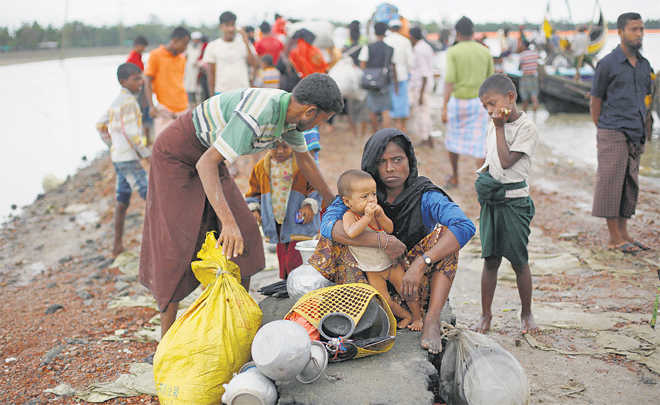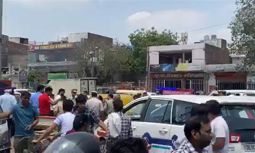
The UN calls the Rohingya the world’s most persecuted minority while a UN official has pulled up India for its tardy response. Reuters
Sandeep Dikshit
For all those hoping that the Indian Government would provide succour to the gathered mass of Rohingya refugees, the moment finally came late on Saturday night. In a statement, South Block expressed its “deep concern” over the hounding of the Rohingya in Myanmar.
The three-week hesitation to the latest round of bloodletting on Myanmar's coast had its roots in the current dispensation’s Hindutva orientation and its distaste for destitute Muslims from other countries parking themselves, possibly permanently, all over the country. This was made clear in the Modi government's mass granting of citizenship to over 4,000 refugees, all of whom were to a man Hindu or Sikh.
In order to retain India's image as a benign do-gooder in Afghanistan, the Modi government continues to accommodate 60,000 of its citizens and does not acknowledge their refugee status but allows the UN to run a programme for them. They are presumably the good Muslims because Prime Minister Modi has made it clear in Myanmar that terrorism was behind the exodus of entire settlements from Arakkan. What was that terrorism factor which has also been repeated by Aung San Suu Kyi?
Both Modi and Aung San were economical with the truth. The trigger for the fresh Myanmar army crackdown on Rohingya Muslims was the August 25 attack on its pickets that extracted several casualties. But the problem has been around for much longer. And it took the form of political and social exclusion: no citizenship, no government jobs that were cornered by the Burman elite from the Irrawaddy basin.
As Suu Kyi is a Burman, she is careful not to alienate them by taking up the cause of the Rohingya who have been renamed Bengalis and asked to ‘go back’.
It wasn't that way in the beginning. In 1936, Gani Markan was elected to Legislative Council Burma from the Burmese national category though he was of Indian origin. The reason for India's circumspect approach to the Rohingya is buried in that period. Indians became pariahs and were chased out from the Irrawaddy delta in the late 1930s. The days of Mere piya gaye Rangoon aur wahan se kiya telephone were over.
Another wave of exodus of people with Indian appearance took place around the Second World War.
As a result, most of India's overtures have been to the Burman elite, such as setting up the first two technical training institutes in the Irrawaddy delta. But the location of the next two institutes, finalised during PM Modi's visit last week, provides clues to India's interest in Myanmar. One will come up in Thaton, a town in the path of an ambitious Indian transport corridor that seeks to end north-east's isolation from the neighbouring growth engines of Thailand and Vietnam. This Indo-Japanese venture to counter China's web of corridors through East Asia. That it was mentioned in a joint Obama-Manmohan Singh statement underlines its strategic significance.
The second will be set up at Monywa, another back-of-the-beyond town, but in a region where India has been stepping up its presence as it helps it keep an eye on the Naga and ULFA leaders based in the sprawling province. This town is on the western bank of the Chindwin river, believed to be the Myanmar regime's unwritten limit for Chinese influence.
It took a lot of effort for India to rebuild ties with the regime after it had supported Suu Kyi. India sought to mark out the region west of the Chindwin river by getting involved in two hydroelectric projects, both of which proved unfeasible. India also militarily aided Myanmar with surveillance planes, patrol boats and military hardware.
The result was lessening of its security-related headaches emanating from Sagaing, where once north-east militants regrouped at will. India's distancing from Suu Kyi and involvement in development projects helped it worm itself into Myanmar army's goodwill. This led to several coordinated operations that raised the cost of anti-India militants setting up a base in Sangaing.
The other reason that has dissuaded India from playing a more active role on the persecution of the Rohingya is that two of its major projects are located in the zone of trouble: three deep-water exploration blocks and a sea-cum-land route to Mizoram, currently delayed due to a horrible mistake in alignment by Indian engineers.
But as other neighbours scrambled to assist the Rohingya, the current government could not have afforded to stay aloof. The MEA statement, however, has no bearing on the living conditions of the Rohingyas who have based themselves in India. The government's attitude can be summed up by a minister's hardhearted statement: They won't be shot or thrown in the sea. The Supreme Court has now taken up the matter. Despite its proclaimed hands-on approach to governance, the government would be happy for the courts to rule on the refugees: it does not affect its strategic partnership with Myanmar and retains the hardline Hindutva base that was opposed to any accommodation to the Rohingya. It also helps refurbish India's image as a country that practices and preaches tolerance that has taken a few body blows.



























